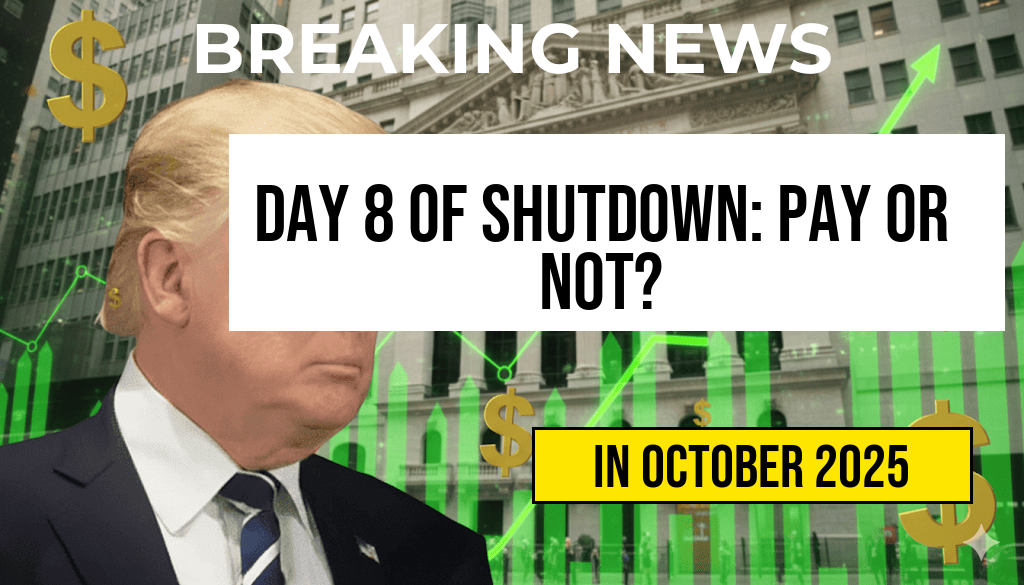As the federal government enters its eighth day of a partial shutdown, thousands of federal employees remain uncertain about their paycheck status. With congressional negotiations stalemated over budget disagreements, concerns are mounting over whether workers will receive their full compensation or face delays and potential deductions. While some agencies have implemented measures to mitigate financial hardship, others have suspended operations entirely, leaving many employees in limbo. This shutdown, the longest since 2018-2019, underscores the economic and administrative strain on government functions and personnel. Experts warn that prolonged funding gaps could have ripple effects on national services, from public health to national security, further complicating the legislative impasse.
Current Status of Federal Pay During the Shutdown
Federal Employees’ Compensation Under the Current Crisis
At present, the federal government has not officially declared whether federal employees will receive their full pay for the duration of the shutdown. Historically, during previous shutdowns, most civilian employees have received their paychecks once Congress reauthorized funding, though delays and partial payments have occurred depending on the length and political context. For example, during the 2018-2019 shutdown, essential workers continued to receive paychecks, while some non-essential staff faced pay delays.
However, the current situation differs as negotiations remain unresolved, and agencies are operating under varying degrees of funding and operational capacity. Some departments, like the Department of Homeland Security, have continued limited operations, often prioritizing security functions, while others, including the Environmental Protection Agency and the Department of Education, have halted most activities. The uncertainty raises questions about whether employees will be compensated in full or if they will face pay shortages once the shutdown concludes.
Legal and Policy Frameworks Impacting Pay
How the Law Addresses Federal Pay During a Shutdown
Under federal law, government employees classified as “excepted” or “essential” are typically required to work during shutdowns without immediate pay, although they are usually compensated afterward. Conversely, “non-excepted” employees are furloughed and do not work or receive pay during the shutdown period unless Congress intervenes. The history of federal shutdowns demonstrates a pattern where pay is often delayed but eventually restored, barring legislative changes.
Recent legislative measures, such as the Pay Our Guard and Reserve Act, have sought to ensure that certain groups of federal workers, including military reserves, continue to receive pay, but its applicability to civilian federal employees remains limited. As negotiations continue, the legal question of whether pay will be guaranteed remains unresolved, adding uncertainty for the workforce.
Financial Impacts on Federal Employees
Potential Consequences of No or Partial Pay
| Scenario | Financial Effect | Employee Actions |
|---|---|---|
| Full pay received | No immediate hardship; bills paid normally | Continue routines without concern |
| Delayed pay or partial pay | Cash flow disruption; late bill payments | Seek emergency assistance or loans |
| No pay during shutdown | Potential hardship; reliance on savings or credit | Financial planning or hardship applications |
Many federal workers rely on their regular paychecks to meet mortgage, rent, and daily expenses. The prospect of delayed or missing payments has prompted some to seek emergency financial assistance, while others are concerned about accruing late fees or damage to credit scores. The economic fallout extends beyond individual employees, affecting local economies and small businesses that rely on federal contracts and payrolls.
Political Negotiations and Outlook
Stalemate and Potential Pathways Forward
As congressional leaders remain deadlocked over budget priorities, the likelihood of an immediate resolution appears uncertain. Democrats and Republicans continue to exchange blame over the impasse, with debates centered around funding for border security, defense, and social programs. Some lawmakers advocate for a short-term CR (Continuing Resolution) to reopen government functions temporarily, while others push for long-term budget agreements.
President Biden has expressed frustration over the prolonged shutdown, emphasizing the importance of restoring funding and protecting federal workers. Conversely, House Republicans cite fiscal concerns and political disagreements as reasons for the delay. The next few days are critical, with ongoing negotiations determining whether a bipartisan deal can be reached to end the shutdown and resume normal operations.
Resources for Federal Employees Affected by the Shutdown
- Federal Employee Education & Assistance Programs: Many agencies offer hardship funds or loan programs for employees facing financial distress. Consult your agency’s human resources department for options.
- Unemployment Benefits: Some furloughed employees may qualify for unemployment insurance. Visit your state’s unemployment office for eligibility details.
- Official Updates: Stay informed through Office of Personnel Management (OPM) notices and your agency’s communications for the latest on pay and operations during the shutdown.
Frequently Asked Questions
Question
What is the current status of federal employees’ pay on Day 8 of the government shutdown?
Question
Will federal employees receive their full pay during the ongoing shutdown?
Question
Are there any financial assistance options available for federal employees affected by the shutdown?
Question
How is the government shutdown impacting federal services and employee compensation?
Question
What steps are being taken by government officials to address pay delays for federal workers during this shutdown?








